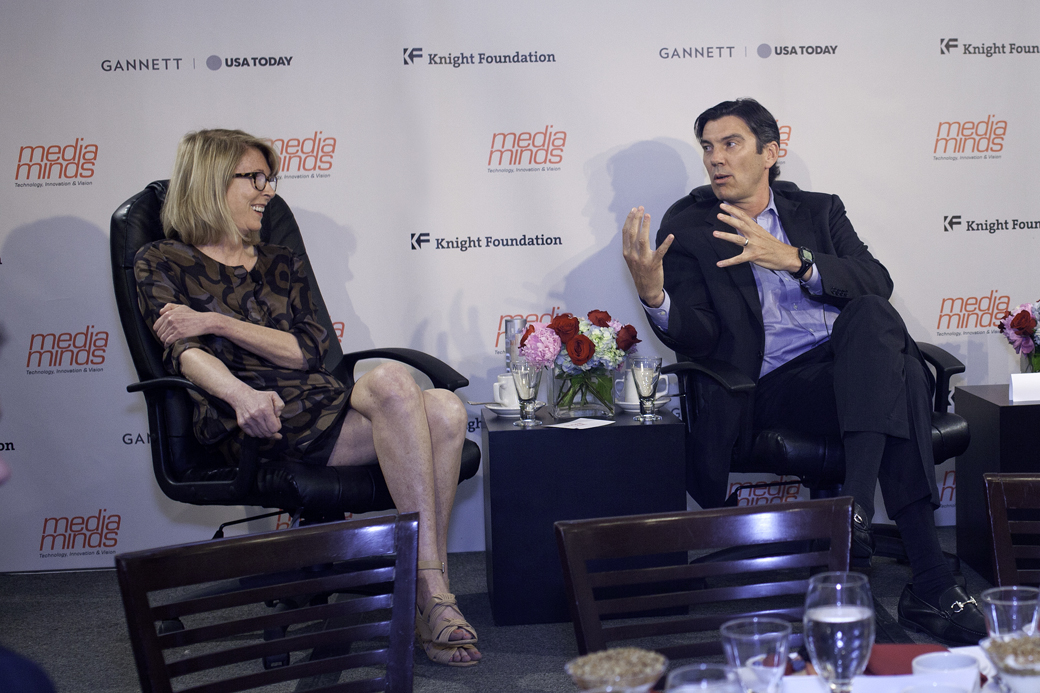
What do women want? To create a better Internet, says AOL CEO
Above, AOL’s CEO of Brand Group, Susan Lyne, and company CEO Tim Armstrong
AOL is deliberately steering away from the engineer-driven, male-dominated Internet culture spawned by Silicon Valley and focusing on creating the Internet programming that people really want, AOL CEO Tim Armstrong told media industry leaders at a Knight Foundation-sponsored event Thursday in New York.
Armstrong, sharing a stage with top deputy Susan Lyne at the Media Minds breakfast, added that with women increasingly becoming the dominant users of online content and commerce sites, AOL’s mostly female top management team represents a competitive advantage, “because they bring an understanding of the half of the world that our competitors lack.”
“People want quality content from trusted sources,” rather than spending their time hunting for it in the wilds of the web, Armstrong said, explaining why he believed this strategy had broad general appeal. Lyne evoked the model of television, where franchises were built on programming, to argue that quality content brands represent the future.
Since splitting with Time Warner more than three years ago, AOL has acquired TechCrunch, Engadget, The Huffington Post and others, which combined attract 200 million monthly visitors, 100 million of those in the United States, Armstrong said.
A former Google executive, Armstrong clearly doesn’t mind the work of all those engineers as long as it stays beneath the hood. He described AOL as running on state-of-the-art ad serving technology, targeting users and delivering pricing in real time. In fact, he said the technology was so good that he expected it to soon deliver future pricing, following the lead of Wall Street’s automated trading systems.
He said he expected marketing departments to start adding “programmatic” ad buyers in the same way they added search-engine optimization experts a decade ago, leveraging the demographic and behavioral information websites can collect. As for mobile app developers, Armstrong advised them to build in those data collection capabilities, because they can mean a ten-time difference in the value of an ad. Not abusing that data is equally important, he said.
“If you lose the trust of your users, it’s game over in our business. I’d guess that if the government loses trust, it’s a big problem, too,” he said, in response to a question from moderator Alex Jones about privacy concerns and the National Security Agency’s data collection programs.
Privacy issues aside, Armstrong’s remarks underlined how online advertising is completely commoditized. He said the revenue growth for AOL was not in banner ads, but around high-touch marketing services that gave brands deep connections to their audiences. It’s not unlike the lesson some non-profit news publishers have learned, about building sustainability on strong relationships, not just transactions.
While Armstrong talked about quality content and trusted sources, he did not speak explicitly about the value of news and information to communities. He said there was great potential for Patch, AOL’s struggling hyperlocal news network, to expand to more cities, but that “stability and profitability” was the first step. Last month, Armstrong made another round of cuts at Patch, consolidating 20 regional news offices into nine.
The Media Minds breakfast was the first in a quarterly series of media industry gatherings sponsored by Knight. It revives in a new way the five-year media breakfast series run by Syracuse University’s Newhouse School of Communications, which allowed top media industry people to connect in an informal setting to talk about the fast-changing industry. Participants included Derek T. Dingle, senior vice president and editor-in chief, Black Enterprise; Lynda Hammes, publisher, Foreign Affairs; Liz Kaplow, president & CEO, Kaplow Communications; Larry Kramer, president and publisher, USA Today; Stephen B. Shepard, dean, CUNY Graduate School of Journalism; Jon Steinberg, president & COO, BuzzFeed; Arthur Ochs Sulzberger, Jr., chairman and publisher, The New York Times Co.; Richard J. Tofel, president, ProPublica; and Sherrie Rollins Westin, executive vice president and chief marketing officer, Sesame Workshop.
By Andrew Sherry, vice president/communications at Knight Foundation
Recent Content
-
Journalismarticle ·
-
Journalismarticle ·
-
Journalismarticle ·


